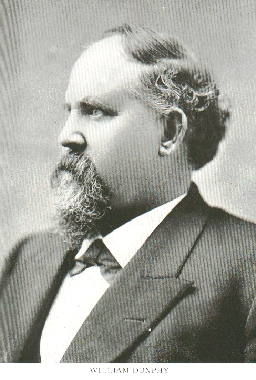
William DUNPHY
William
DUNPHY. The name of William DUNPHY at
one time was a power in California and Nevada, associated with a vast domain of
ranch land, and with some of the largest interests in the West. William DUNPHY was a California pioneer and
one of the strong figures in the generation of strong and courageous men.
He
was born in Kilkenny, Ireland, December 24, 1829, son of William and Mary
(CARROLL) DUNPHY, who spent all their lives in Ireland. Three of the sons came to America and to
California. The other two were James
and Kenney, who followed mining.
William DUNPHY had a brief career of education in the schools of
Ireland, worked on his father’s farm, but at the age of eleven obeyed the
prompting of a restless nature and ran away from home, securing passage on a
vessel that landed at St. Johns,
Newfoundland. He reached there before
he was twelve years of age, friendless and practically penniless. He worked in the fishing industry, and soon
took passage on a vessel bound for a seal hunt. A full cargo of seals was secured, but on the return the vessel
was wrecked on the ice, and many of the crew lost. The remainder, after forty-eight hours of suffering and when
almost frozen and starved, were rescued by a passing vessel. This vessel encountered storms, and was
shipped from port four months, during which time food gave out and death by
starvation again stared them in the face.
A passing vessel gave them provisions and finally they reached St. Johns
in safety.
Mr.
DUNPHY’s next experience was in New York, but a few months later went South and
for several years engaged in cattle trading along the Mississippi. In 1846,during the Mexican war and when only
eighteen years of age, he contracted to furnish the United States army with
beef. Finally he joined Jack HAYE’s
Regiment of Texas Rangers, and was wounded several times in skirmishes. Following the war he engaged in the cattle
business at Brownsville, Texas, but in 1849, news of gold discoveries in
California having reached him, he started on horse back with another party of
gold seekers. They went by way of Mexico and in the vicinity of Durango
encountered hostile Indians and had many fights on the way. Finally they reached Mazatalan, whence a
French bark took them up to San Francisco, arriving there December 21,
1849. William DUNPHY bore scars to his
grave, reminiscent of encounters with the Indians and bad men.
From
San Francisco he at once went to the mines on Wood Creek in Tuolumne County,
and experienced thirty days of successful gold digging. He tired of mining, and turned his attention
to the cattle business as a dealer and raiser.
In 1855 he became associated with Thomas HILDRED, and this firm up to
1881 was one of the largest in ranching operations in the West. In 1881, Mr. DUNPHY acquired the HILDRED
interests. The first ranch of the firm,
located in San Joaquin Valley, was sold.
Mr. DUNPHY owned ranches in
Elko, Eureka and Lander Counties, Nevada, embracing about 200,000 acres and
frequently as high as 30,000 head of cattle and herds of horses were grazing on
his pastures. The Central Pacific
Railway was built through the DUNPHY ranch, which bordered it for some
twenty-five miles. He owned another
ranch of 12,000 acres in Monterey County, California. William DUNPHY was one of the first ranchers to introduce blooded stock, and had many Herefords,
Shorthorns and Jersey cattle. He helped
establish the DUNPHY & HILDRED slaughter house of San Francisco, and
acquired large parcels of San Francisco real estate.
In
1852 Mr. DUNPHY married Carmen UVILLA, who was born in Chile, South America,
daughter of Carlos UVILLA, who came to California as a miner.
William
DUNPHY was a democrat and was a delegate to the National conventions that
nominated Samuel J. TILDEN and Grover CLEVELAND. He and his wife were Catholics, and he was a member of the
Pacific Yacht Club, the Olympic Club and a life member of the Society of
California Pioneers.
His
children were James C., Carrie, Mary, Julia and Jennie. James C. is a life member of the Society of
California Pioneers. Julia became the
wife of Samuel PEARSON, and Mary, the wife of Noah FLOOD.
Noah
FLOOD was a native of Kentucky, but was reared and educated in Missouri, and in
the early ‘70s came to California and was a successful educator, being
principal of several schools in San Francisco.
He studied law, and carried on an extensive general practice in San Francisco
until his death in 1910.